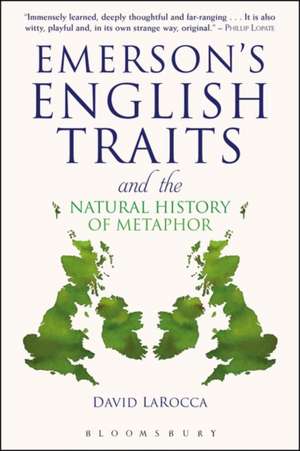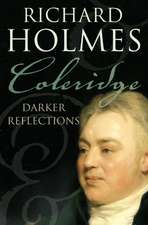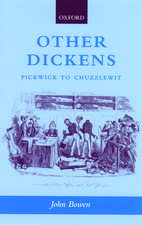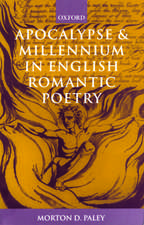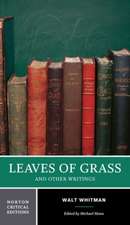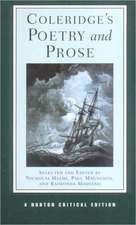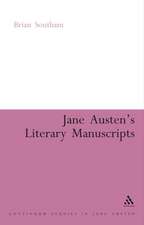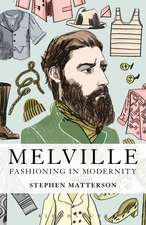Emerson's English Traits and the Natural History of Metaphor
Autor Dr. David LaRoccaen Limba Engleză Paperback – 20 noi 2013
Preț: 223.04 lei
Preț vechi: 248.48 lei
-10% Nou
Puncte Express: 335
Preț estimativ în valută:
42.68€ • 44.40$ • 35.24£
42.68€ • 44.40$ • 35.24£
Carte tipărită la comandă
Livrare economică 12-26 aprilie
Preluare comenzi: 021 569.72.76
Specificații
ISBN-13: 9781441161406
ISBN-10: 1441161406
Pagini: 408
Dimensiuni: 152 x 229 x 28 mm
Greutate: 0.61 kg
Editura: Bloomsbury Publishing
Colecția Bloomsbury Academic
Locul publicării:New York, United States
ISBN-10: 1441161406
Pagini: 408
Dimensiuni: 152 x 229 x 28 mm
Greutate: 0.61 kg
Editura: Bloomsbury Publishing
Colecția Bloomsbury Academic
Locul publicării:New York, United States
Caracteristici
A sweeping examination of Emerson's engagement with the major issues and writers of the nineteenth-century.
Notă biografică
David LaRocca (Ph.D., Vanderbilt) is Writer-in-Residence in the F. L. Allen Room at the New York Public Library and Fellow at the Moving Picture Institute in New York. Author of On Emerson (2003), editor of Stanley Cavell's Emerson's Transcendental Etudes (2003) and Estimating Emerson: An Anthology of Criticism from Carlyle to Cavell (2013), he was Harvard's Sinclair Kennedy Traveling Fellow in the United Kingdom, and consultant to the American Museum of Natural History, during the composition of this book.
Cuprins
Prefatory Notes .......................................................................................................Introduction: Some Traits of English Traits .....................................................I. More Prone to Melancholy.............................................. II. With Muffins and Not the Promise of Muffins............III. The Lively Traits of Criticism..........................................IV. The Cabman is Phrenologist So Far ..............................V. The Florilegium and the Cabinets of Natural HistoryVI. Founding Thoughts...........................................................VII. A Child of the Saxon Race...............................................VIII. Living Without a Cause.....................................................IX. Adapting Some Secret of His Own Anatomy...............X. First Blood..........................................................................XI. Second Selves......................................................................XII. Genealogy and Guilt...........................................................XIII. The Pirate Baptized............................................................. XIV. My Giant Goes With Me................................................... XV. Corresponding Minds........................................................ XVI. Titles Manifold..................................................................... Acknowledgements .................................................................................................... Notes ......................................................................................................................... Index ..........................................................................................................................
Recenzii
This immensely learned, deeply thoughtful and far-ranging book helps re-situate Emerson in his own time, and in ours. More than just a work of scholarship, it rises to the level of philosophical investigation. It is also witty, playful and, in its own strange way, original.
Emerson suggests in 'The American Scholar' that the final value of a book is that it is a resource. Emerson's English Traits and the Natural History of the Metaphor is a resourceful and generative book, full of disparate insights and insinuations that future scholars will take up in reassessing the relevance of English Traits in an increasingly transatlantic field . In making a new case for the philosophical sophistication of English Traits, LaRocca has achieved his own Emersonian feat, the creation of a new 'atmosphere in which to think' (140).
I imagine David LaRocca having fun composing this book ... [I]t is an engaging experiment in criticism, an attempt to perform literary study in such a way as to bring its subject to life ... He has inventively devised a cabinet-like structure for his own book on Emerson's cabinet-like structures; LaRocca sets about, assiduously and artfully, composing, gathering, sequencing and otherwise curating its contents ... The patient reader, the reader willing to make "interpretive shifts," a reader capable of "loyalty to the present" and of reinforcing "an openness to the complexity of emerging phenomena," will find [the] atmosphere by turns exhilarating, confusing, enticing, and drowsy with the hum of bees. Nevertheless, the reader must grant that removing Emerson's writing from a museum and placing it in a florilegium does wonders for its constitution.
With this study, LaRocca emerges as a theorist as well as an important scholar of Emerson in an age when "theory" has become a footnote ... This study should be read by those who think themselves comfortable with Emerson, and by those who feel abandoned by theory. Mostly, though, this should be read by those who are in interested in figuring the thought that lies beyond reach. Summing Up: Highly recommended. Upper-division undergraduates and above.
David LaRocca treats Emerson's English Traits with the philosophical seriousness and sophistication the book has long deserved, but never before so richly received. In elegant numbered paragraphs of subtle, self-reflexive philosophical prose, LaRocca refracts a selection of the book's principal metaphors through a remarkably wide array of related texts ranging from Seneca to Augustine to Darwin, Nietzsche, and, especially, Wittgenstein. The result is not a conventional academic study, but rather a many-faceted Emersonian reflection by quotation on such topics as evolution, originality, liberalism, American identity, self-renaming, and the fecund nature of metaphor itself. This is a valuable contribution to the re-assessment of Emerson's most neglected work, and a distinctive example of creative hermeneutical engagement.
In this elegantly written, scrupulously researched book, David La Rocca has convincingly demonstrated that, rather than locating a restricted area of inquiry, Natural History constitutes the grounding precondition for Emersonian thinking. Emerson's English Traits and the Natural History of Metaphor will surely prove an indispensable reference for undergraduates and graduates alike.
In this wonderful book, David LaRocca illuminates Emerson's mind by, in effect, pursuing his methods. LaRocca's treatment of English Traits is no mere academic summary. Rather, his object is to conduct his own natural history of metaphor, with a view to illuminating the role of metaphor, both for Emerson and more generally, in welding disjointed 'naturalistic' observations into coherent and intelligible wholes. With a vast range of reference, running from Wittgenstein to Darwin and from Coleridge to Montaigne, and an engagingly 'album'-like structure, the book traces Emersonian connections between topics as remote as the origins of evolutionary theory, the making of commonplace books and the rise of the American anti-slavery movement. It offers a glitteringly many-sided examination of the evolution of Emerson's deeply creative mind in its efforts to arrive at an understanding, not only of England, but also of the nascent American culture that it was in process of helping to form.
In this finely crafted and highly original piece of scholarship, LaRocca not only draws attention to one of the most neglected texts in Emerson's oeuvre, he also presents an extended and insightful meditation on the nature of metaphor and the formation of cultural identity. Like a true florilegium, the collection of remarks continuously surprises-but not with gimmicks, rather with the kind of uncanny observations the method of criticism and arrangement is meant to illuminate. Combining literary sensibility with philosophical acumen, Emerson's English Traits and the Natural History of Metaphor also prompts urgent and serious reflection on the relation between literature, philosophy and natural science more generally. Its publication is, therefore, as timely as Nietzsche's Untimely Meditations, and should be greeted with just as much applause.
Emerson suggests in 'The American Scholar' that the final value of a book is that it is a resource. Emerson's English Traits and the Natural History of the Metaphor is a resourceful and generative book, full of disparate insights and insinuations that future scholars will take up in reassessing the relevance of English Traits in an increasingly transatlantic field . In making a new case for the philosophical sophistication of English Traits, LaRocca has achieved his own Emersonian feat, the creation of a new 'atmosphere in which to think' (140).
I imagine David LaRocca having fun composing this book ... [I]t is an engaging experiment in criticism, an attempt to perform literary study in such a way as to bring its subject to life ... He has inventively devised a cabinet-like structure for his own book on Emerson's cabinet-like structures; LaRocca sets about, assiduously and artfully, composing, gathering, sequencing and otherwise curating its contents ... The patient reader, the reader willing to make "interpretive shifts," a reader capable of "loyalty to the present" and of reinforcing "an openness to the complexity of emerging phenomena," will find [the] atmosphere by turns exhilarating, confusing, enticing, and drowsy with the hum of bees. Nevertheless, the reader must grant that removing Emerson's writing from a museum and placing it in a florilegium does wonders for its constitution.
With this study, LaRocca emerges as a theorist as well as an important scholar of Emerson in an age when "theory" has become a footnote ... This study should be read by those who think themselves comfortable with Emerson, and by those who feel abandoned by theory. Mostly, though, this should be read by those who are in interested in figuring the thought that lies beyond reach. Summing Up: Highly recommended. Upper-division undergraduates and above.
David LaRocca treats Emerson's English Traits with the philosophical seriousness and sophistication the book has long deserved, but never before so richly received. In elegant numbered paragraphs of subtle, self-reflexive philosophical prose, LaRocca refracts a selection of the book's principal metaphors through a remarkably wide array of related texts ranging from Seneca to Augustine to Darwin, Nietzsche, and, especially, Wittgenstein. The result is not a conventional academic study, but rather a many-faceted Emersonian reflection by quotation on such topics as evolution, originality, liberalism, American identity, self-renaming, and the fecund nature of metaphor itself. This is a valuable contribution to the re-assessment of Emerson's most neglected work, and a distinctive example of creative hermeneutical engagement.
In this elegantly written, scrupulously researched book, David La Rocca has convincingly demonstrated that, rather than locating a restricted area of inquiry, Natural History constitutes the grounding precondition for Emersonian thinking. Emerson's English Traits and the Natural History of Metaphor will surely prove an indispensable reference for undergraduates and graduates alike.
In this wonderful book, David LaRocca illuminates Emerson's mind by, in effect, pursuing his methods. LaRocca's treatment of English Traits is no mere academic summary. Rather, his object is to conduct his own natural history of metaphor, with a view to illuminating the role of metaphor, both for Emerson and more generally, in welding disjointed 'naturalistic' observations into coherent and intelligible wholes. With a vast range of reference, running from Wittgenstein to Darwin and from Coleridge to Montaigne, and an engagingly 'album'-like structure, the book traces Emersonian connections between topics as remote as the origins of evolutionary theory, the making of commonplace books and the rise of the American anti-slavery movement. It offers a glitteringly many-sided examination of the evolution of Emerson's deeply creative mind in its efforts to arrive at an understanding, not only of England, but also of the nascent American culture that it was in process of helping to form.
In this finely crafted and highly original piece of scholarship, LaRocca not only draws attention to one of the most neglected texts in Emerson's oeuvre, he also presents an extended and insightful meditation on the nature of metaphor and the formation of cultural identity. Like a true florilegium, the collection of remarks continuously surprises-but not with gimmicks, rather with the kind of uncanny observations the method of criticism and arrangement is meant to illuminate. Combining literary sensibility with philosophical acumen, Emerson's English Traits and the Natural History of Metaphor also prompts urgent and serious reflection on the relation between literature, philosophy and natural science more generally. Its publication is, therefore, as timely as Nietzsche's Untimely Meditations, and should be greeted with just as much applause.
